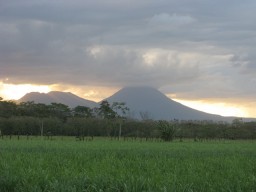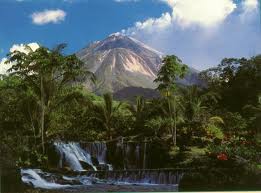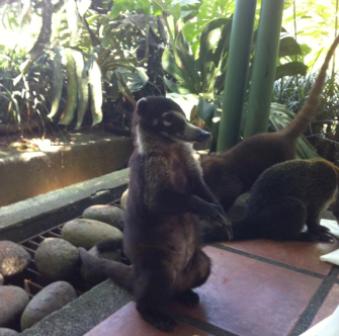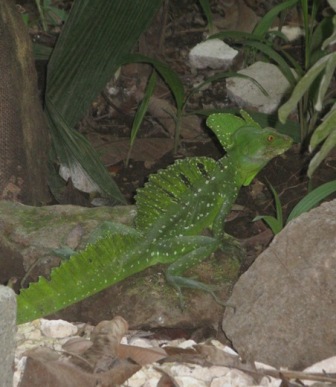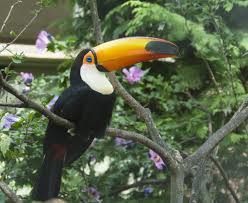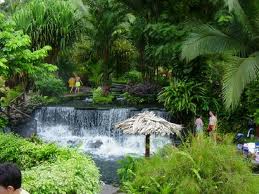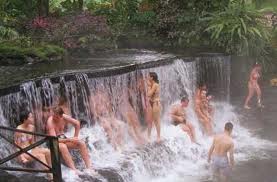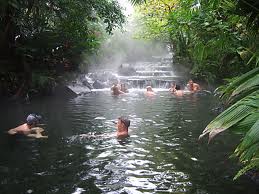Costa Rica’s businesses are doing a roaring trade in sustainable travel and eco-tourism. For a small country, it packs a lot in.

I’m minding my own business, sipping from a cup of coffee while meandering through a three day old copy of the International Herald, waiting patiently for an order of huevos rancheros to be delivered. So far, it’s been another beautiful morning of bright sunshine, clear skies and fresh air at Tabacon Grand Spa Thermal Resort. A few kilometres away volcanic Mount Arenal thrusts upwards into its perpetual cloud halo, green summit peaking above like a pointed cap on a white sombrero brim.
Gelled into a state of scenic euphoria by Arenal’s constant beauty, I barely notice the waitress as she approaches with my plate. She walks straight towards me from the open air kitchen but stops suddenly and looks over her right shoulder, not in my direction but back towards the kitchen away from Arenal’s commanding presence. Eventually she slides my huevos on to the table. ‘Coatis,’ she says. ‘En la cocina.’
A troupe of coati-mundis is making a daily visit at the end of the morning’s service, searching for a hand out. Today’s treats are pancakes. I quickly finish my breakfast, down a glass of freshly squeezed orange juice, grab my camera and join the coatis for their turn at the breakfast buffet.
The previous night, a raccoon scampered behind my bar stool while I was sipping on a potent mango daiquiri in the hotel lobby’s garden bar. Universally nicknamed ‘masked bandits’ this particular black-eyed shape-shifter pauses only to sniff an empty table (no leftover peanuts) and nearby lounge chair (no leftover food scraps hidden in the cushion) then disappears into the night.
While quaffing my second daiquiri, other guests also began to appear comically raccoon-ish, an effect of candlelight reflecting off sun burnt faces outlined by absent sunglasses.
Earlier that same day, shortly after my arrival to Tabacon I spied a basilisk lizard camouflaged behind a fern, positioning itself in a manicured plant arrangement as if frozen in space and time. When I turned to another guest and exclaimed, ‘Look, a rare lizard,’ the basilisk had suddenly disappeared and I was caught pointing uselessly and somewhat stupidly at a plain palm frond. That damn lizard was not seen again but I did have my camera ready.
The following day in my room, gazing into jungle before breakfast from behind a wall of windows, I sit at my desk checking emails when a passing toucan chooses to perch on a tree limb just a few metres away from my laptop. So entranced by this bird’s sudden appearance, I forget to grab my camera. Do I need to have the camera permanently attached to my face while staying at Tabacon? Probably yes if I’m to have any luck taking snapshots of ethereal wildlife.
Raccoons and coati-mundis are cousins, in the same animal family. Their paths cross only in Central America. Raccoons are North Americans. Coatis are South Americans. They occasionally meet in the middle, often where mango daiquiris are served. Costa Rica is in the middle of Central America, well known for the quality of its superlative mango daiquiris and raccoon coati interaction.
Politically speaking, Costa Rica is something of an anomaly. Surrounded by countries where corruption and guerrilla warfare are common, it sits peacefully like a green oasis in a desert of political destruction.
What’s Central America infamous for apart from exploding volcanoes, hurricanes and mono-cultured banana plantations?
Insurrection and revolution come immediately to mind. Since the late 60s, El Salvador, Nicaragua, Panama, Guatemala and Honduras have all been damaged severely by internecine strife.
During the last fifty years, only Belize (independent from the U.K since 1981) and Costa Rica have remained continuously safe for travellers.
In 1949, Costa Rica became one of the world’s few countries to abolish its military force by constitutional decree. A police force continues to operate, keeping crime mostly in check, but an army is non-existent.
Call me pie-eyed, but I feel very safe in a country without military personnel.
Environmentally speaking, Costa Rica is a world leader. Nearly 26% of its land area is devoted to national parks, biological reserves and officially protected forest areas, representing some 1,304,000 hectares. Each year over 300,000 visitors come to Costa Rica just to venture into its parks.
Back to breakfast… Coati-mundis have long tapered claws and sharp teeth, which belie their outward appearance. These small, furry and cute scroungers have the table manners of tiger sharks. It’s a snatch-and-grab breakfast frenzy, the dominant females and males hiss at low ranking troupe members, snapping at them if they get too close to choice bits of pancakes fresh off the griddle. I toss a few pieces over their dominant heads, aiming for the troupe’s outsiders.
Unlike the raccoon, basilisk lizard and toucan, the coatis are in full view of other late breakfasting guests. I need not say, ‘But it was there a second ago.’
Tabacon Grand Spa Thermal Resort is indeed something of a haven for wildlife. Everywhere I look other creatures are having a look at me, or grabbing pancakes from my hand.
Perhaps it’s possible to visit Tabacon and not see wildlife, but I don’t see that as being realistic. The Costa Rican highland jungles throb with life. Bio-diversity in these areas is a catch-phrase for ‘the neighbourhood’.
Though wildlife adds much to Tabacon’s undoubted charms, most visitors come here to take the waters. The whole resort is promoted to potential customers through its private access to volcanic thermal springs. Mount Arenal’s thermal steamy vents bubble underground like massive pressure cookers, heating fresh mountain water to various degrees of warmth, from scalding to tepid. In a region where average annual rainfall is around 350 centimetres, there’s plenty of water to go round, above ground and below.
The scalding pools are proscribed as wisely off limits to visitors while the hot, warm, tepid or cool springs are open to hotel guests and visitors alike, though hotel guests receive special passports to the best bits of the vast areas of springs and pools tumbling through lush jungle gardens.
To describe these springs as Eden-esque doesn’t do them justice. Sometimes mankind and nature come together in a semblance of perfect harmony.
Tabacon’s springs and its gardens are prime examples of how best to integrate nature and commerce with low-impact human adjustment.
Tabacon is a fully self-contained resort. The region’s main tourist town, La Fortuna is approximately ten kilometres away. It’s packed with low-budget hostels like I’ve seen everywhere else in similar tourist towns from Egypt to Indonesia. Cafes advertising banana pancakes, milkshakes and burgers look pretty much the same here as they do in Des Moines, Iowa, except here the streets are slightly more littered but the hand painted signs are more quaint.
After more than 400 years of dormancy, in 1968 Mount Arenal erupted spectacularly and suddenly, killing 87 people and burying three nearby villages: Tabacon, San Luis and Pueblo Nuevo under metres of volcanic ash. La Fortuna (The Fortune) town subsequently emerged as the main entry point to the Tabacon tourist zone, its national park and gorgeous lake at the base of the volcano itself.
Tabacon Grand Spa Thermal Resort is the region’s best and well worth the price. If a break from laying about on one of Costa Rica’s enticing beaches or from enthusiastically enjoying one of its many national park treks is needed, a bit of luxury at a volcanic springs is the ticket.
Just watch out for coati-mundi greed at breakfast, camera shy toucans, basilisk lizards practicing invisibility tricks and bar hopping raccoons.
Tom Neal Tacker visited Costa Rica as a guest of Tabacon Grand Spa Thermal Resort.
Naked Facts:
See www.tabacon.com for details and bookings.
The resort operates a professional spa, aptly named the Grand Spa, as well as maintaining the gardens and water quality of its private volcanic springs. The usual massages, manicures, pedicures, facials and other healing options are on offer. The Grand Spa’s treatment rooms and grounds look impressive but I’m unable to lend advice about the quality of its treatments. None was offered. Bookings were difficult to come by and I felt a bit at the low end of the totem pole in terms of access.
The resort operates two restaurants, one at the thermal springs approximately 500 metres walk from the resort itself and one in the resort grounds near its pool. The thermal spring’s restaurant caters to both hotel guests and day-trippers and operates as a buffet. Enough said.
The more upmarket restaurant on the resort grounds is actually quite lovely. Food is well above standard resort fare in this part of the world with some dishes indicating thoughtful and talented execution.
Service in all areas of the resort is flawless. All employees with whom I interacted were friendly, efficient, informed and downright charming.
I was given a suite for my two night’s stay. I think it was the same one the actor Will Smith occupied when he stayed in the area while making a film. It was huge and well appointed with large floor to ceiling windows. Unfortunately, building repairs were taking place outside my windows in the rooms next door. Construction noise intruded during the day but didn’t seem to bother the toucan.
Tabacon Grand Spa Thermal Resort is approximately three hours drive from Costa Rica’s capital city, San Jose. Private mini-bus transport to and from various hotels in San Jose to Tabacon can be organised by the resort when booking. Cost is approximately USD$100 return trip. Taxis to and from San Jose and the resort are available but vastly more expensive. Negotiate the fare before departure. Costa Rican roads are narrow and crowded. Journeys take much longer than distance would lead one to assume. Go slow and enjoy the ride. The scenery is magnificent and people are obedient to road rules.
Naked Tips:
Costa Rica’s Tourism Board operates a website. See: www.visitcostarica.com
My experience dealing with the official tourism board was very disappointing. Three separate email enquiries went unanswered. Frustrated, I rang the international marketing representative in the USA, reached a voice mail message, left a reply with contact details and reference to unanswered emails but never received a reply to that message either.
For a country so heavily reliant upon tourism for its economic success, I found its national tourism board’s inaction farcical in its treatment of genuine inquiries about travel to and within its country.
NHT’s advice is to view the website merely as a suggestive information source. Gaining real sound advice from a Costa Rican national tourism board employee is apparently a chimera.

